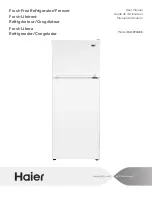
14
Transporting the unit
To prevent damage to the unit during transport, ensure that all
accessories and components inside and around the appliance
are securely fastened.
The unit must only be transported in its vertical position; do not
tilt any more than 30°.
Once the unit has been positioned, wait for about 30 minutes
before it is connected to the mains.
If the unit has been tilted more than 30° during transport, allow
it to stand in an upright position for at least 4 hours before it is
connected to the mains.
Disposal
This appliance has been manufactured from
recyclable materials. After removing the plug from the
wall socket, the unit should be rendered unusable
by cutting off the power cord before being disposed
of through special waste collection points in accordance with
dishwasher.
∙
Do not use abrasives or harsh cleaning solutions or any
cleaning agents that contain alcohol.
∙
After cleaning, thoroughly clean all surfaces again with fresh
water before wiping them completely dry. When re-inserting
the plug into the wall socket ensure that you have
dry
hands
.
∙
Turn the temperature control to its maximum setting. After 24
hours, the temperature control can be returned to its normal
setting.
∙
Take care not to remove or damage the rating plate inside
the cabinet during cleaning.
∙
To save energy, the compressor (at the rear) should be
cleaned carefully at least twice a year with a brush or a
vacuum cleaner.
Energy saving tips
∙
The appliance should be set up in a well-ventilated, dry
room.
∙
Do not expose the appliance to direct sunlight, and do not
position it next to any heat sources (radiators, cookers etc).
If this cannot be avoided, however, suitable insulation must be
installed between the heat source and the unit.
∙
Do not cover the ventilation openings and grilles, and ensure
suf
fi
cient air circulation behind the unit.
∙
The compressor (at the rear) should be cleaned at regular
intervals. Accumulated dust causes an increase in energy
consumption.
∙
Warm food should be allowed to cool down before it is
stored inside.
∙
To prevent an increased build-up of ice, do not leave the
freezer door open for too long when loading or taking out
food.
∙
Frequent de-frosting helps to save energy. For detailed
information on cleaning the appliance, please refer to the
section
De-frosting and cleaning
.
∙
Do not set a lower-than-necessary temperature. For detailed
information on the temperature settings, please refer to the
section
Temperature control
.
Trouble-shooting
Certain typical sounds can be heard when the appliance is
switched on. These sounds are:
∙
caused by the
electrical motor within
the compressor
assembly; during
compressor start-up
the sound level will be
slightly higher for a
limited period of time.
∙
caused by the cooling agent
fl
owing through the circuit.
The following table lists the possible malfunctions, their
probable causes and solutions. In the event of operational
problems, check
fi
rst whether a solution can be found using this
table. If the problem persists, disconnect the appliance from the
mains power and contact our Customer Service Department.
Problem
Possible cause and solution
The unit is not working.
Check that
∙
power is supplied.
∙
the switch in your home installation fuse box is switched on.
∙
the wall socket is working. This can be done by connecting another electrical device to the
socket and checking for function.
The unit seems to generate
insuf
fi
cient cooling power.
Check whether
∙
too much food has been stored in the unit.
∙
the thermostat is set to position ‚
MIN
‘ (in this case, set it to a suitable higher value).
∙
the door is not properly closed.
∙
the unit is too close to a wall or other object at the rear or to the sides.
The normal operating sound
changes or becomes louder.
Check whether
∙
the unit has been properly positioned.
∙
any objects or obstructions are touching the rear of the unit.
∙
there are any objects on top of the unit which might be vibrating.
Summary of Contents for KS 9890 - CONGELATEUR TABLE TOP
Page 68: ...68 R600a GR...
Page 69: ...69 C5 H10 R600a 8 2...
Page 70: ...70 1 2 3 4 5 30 30 4 70 160 5 cm 10 cm 1 11 10 2 9 8 3 6 5 4 5 7 6 1 2 7 4...
Page 71: ...71 8 2 1 9 10 5 6 11 12 9 8 13 10 11 9 14 Min Normal Max 18 C 3 3 5 24...
Page 72: ...72 10 5 3 5 24...
Page 73: ...73 30 30 30 4 MIN...
Page 74: ...74 KS KS 9890 A kWh 166 65 15 24 3 5 N ST C 16 38 C 43 dB a x x mm 847 x 494 x 494 27...
Page 75: ...75 R600a RU...
Page 76: ...76 C5 H10 R600a 8 2...
Page 77: ...77 1 2 3 4 5 30 30 4 70 160 5 10...
Page 79: ...79 3 5 24 10 5 3 5 24...
Page 80: ...80 30 30 30 4 MIN...















































